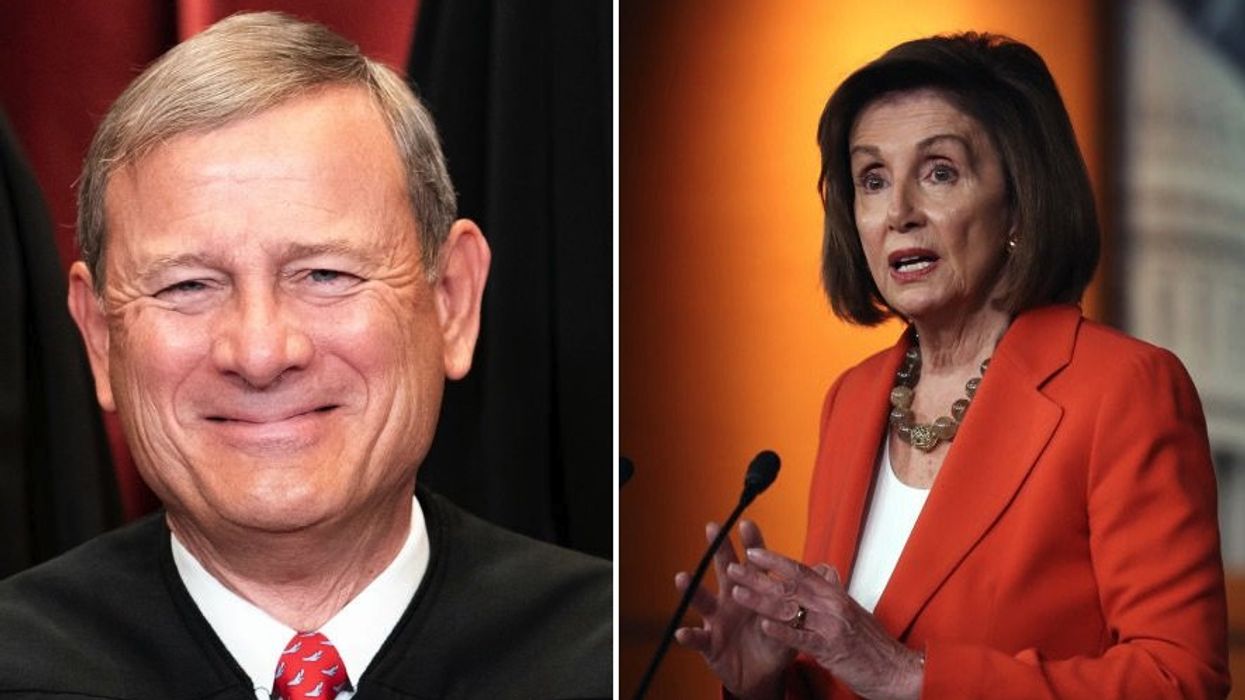
Erin Schaff-Pool/Getty Images (left), Chip Somodevilla/Getty Images (right)

The Supreme Court struck down President Joe Biden's student loan forgiveness on Friday — and used Rep. Nancy Pelosi's own words to bolster the ruling.
In a 6–3 ruling, the court said the petitioner in Biden v. Nebraska had standing under Article III to bring the lawsuit and then applied the so-called "major questions doctrine" to determine that student loans cannot be canceled under the the 2003 HEROES Act, the law Biden claimed gave the Education secretary statutory authority to wipe away $430 billion in student loans.
In short, the court ruled that Biden cannot cancel $430 billion in student loans using the HEROES Act because Congress never intended the law to be used that way.
"Congress did not unanimously pass the HEROES Act with such power in mind," Chief Justice John Roberts explained.
Roberts then quoted Pelosi when she declared in 2021 that Biden cannot unilaterally cancel student loans:
As then-Speaker of the House Nancy Pelosi explained: "People think that the President of the United States has the power for debt forgiveness. He does not. He can postpone. He can delay. But he does not have that power. That has to be an act of Congress."
One of the key questions of the case, Roberts explained, is "not whether something should be done; it is who has the authority to do it."
"The dissent is correct that this is a case about one branch of government arrogating to itself power belonging to another. But it is the Executive seizing the power of the Legislature," he wrote. "Among Congress’s most important authorities is its control of the purse. ... It would be odd to think that separation of powers concerns evaporate simply because the Government is providing monetary benefits rather than imposing obligations."
This ruling, then, means that mass debt cancellation is not unconstitutional; if Congress wants to authorize it, by all means. But the ruling makes clear that such widespread (and costly) action requires authorization from the branch of government to which the Constitution delegates the power of the purse.
By contrast, Justice Elena Kagan, who wrote the dissent, accused the Supreme Court of "overreach" and argued mass debt cancellation under the HEROES Act is legal.
She argued the petitioners lacked standing and blasted the majority for "applying the Court’s made-up major questions doctrine to jettison the Secretary’s loan forgiveness plan."
"The result here is that the Court substitutes itself for Congress and the Executive Branch in making national policy about student-loan forgiveness," she wrote. "Congress authorized the forgiveness plan (among many other actions); the Secretary put it in place; and the President would have been accountable for its success or failure."
Shockingly, Kagan also accused the Supreme Court of posing "a danger to a democratic order" because the majority did not agree with the the government's broad interpretation of the HEROES Act.
"The policy judgments, under our separation of powers, are supposed to come from Congress and the President. But they don’t when the Court refuses to respect the full scope of the delegations that Congress makes to the Executive Branch," she wrote. "When that happens, the Court becomes the arbiter—indeed, the maker—of national policy."
Like Blaze News? Bypass the censors, sign up for our newsletters, and get stories like this direct to your inbox. Sign up here!